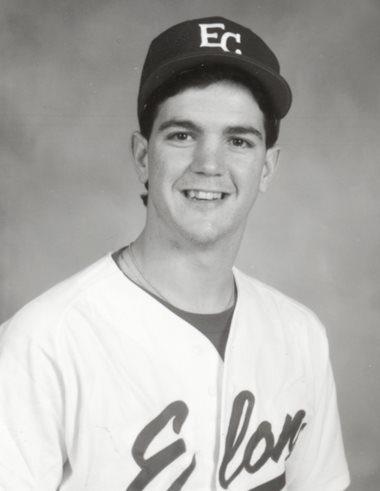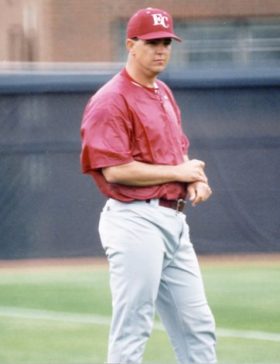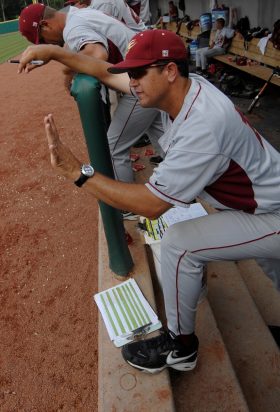What gives Mike Kennedy '91 an edge in coaching? And what might he be doing if he weren’t a baseball coach? Kennedy shed some light on those topics in his interview with The Magazine of Elon.

If his rival Southern Conference baseball coaches were to look for the secret of Mike Kennedy’s success, they might find it in a tree stand in a secluded corner of Caswell County, N.C.
“I try to go hunting as much as I can,” Kennedy says. “I think it keeps me sane, to be honest.”
Oftentimes he’ll take a trip with Mike Harden ’76, who was head coach of Elon’s baseball team when Kennedy rejoined the program as an assistant in 1993. But the appeal of hunting is lost on many of his current colleagues.
“My assistants all go, ‘how can you go sit in a tree? What in the world would entice you to want to sit in a tree for three hours?’ But it’s peaceful,” Kennedy says over the din in the crowded East Gym office he shares with his coaching staff.
“I run a rat race every day with what we do, so it’s nice to get away and run a lot of thoughts through my mind without distraction. I’ve written a million lineups and a hundred speeches in a tree stand. It’s peaceful, there’s nothing around to distract you.”

And if he hadn’t found success coaching baseball?
“I don’t think I could do anything but coach baseball, I’m not good at anything else,” Kennedy quips. But when pressed, he says he’d be interested in – oddly enough – detective work.
He’s an avid fan of A&E’s “The First 48,” a show that focuses on police precincts in cities around the country. One of those precincts is in Miami.
In 2006, when the Phoenix played a road series at the University of Miami, Kennedy met one of the lead homicide detectives featured on the show through a parent of one of Elon’s players.
“I was just joking with him when I said, ‘Hey, if something happens, I’d love to go for a ride with you guys and see how everything works,’” Kennedy recalls. “He said, ‘Well, if something happens, I’ll call you.’”

After the Phoenix defeated the Hurricanes in that evening’s game, Kennedy returned to the team’s hotel to turn in for the night. At 3 a.m., his phone rang; it was the detective. Something had happened, and the detective wanted to know if Kennedy was up for a ride-along. Kennedy said yes, and spent the next day visiting the crime scene, shadowing the detectives as they pieced together evidence and stopped by the morgue.
“I thought, ‘Hey, I could do this job,” Kennedy says, “well, with the exception of seeing the bodies.”
The experience exemplifies one of the reasons Kennedy believes that coaching truly is the career for him.
“I would never have had that opportunity if not for Elon,” he says. “Every day is a perk.”


